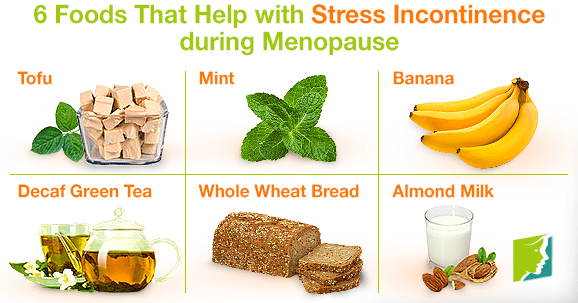Stress incontinence can constantly weight on a woman, whether she is experiencing it directly or worrying about the next episode to come. There are lifestyle changes people can make to reduce the risk of its recurrence and lessen its impact.
Tofu
The leading cause of stress incontinence during menopause is hormonal imbalance, when dipping estrogen levels negatively affect the health of urinary tract lining. Tofu, a soy product, contains high concentrations of phytoestrogens, which mimic the body's own supply of the hormone and help minimize this unwanted side effect. It can be used as a substitute for meat or as an addition to foods as diverse as soup and pizza.
Mint
Many spices are known to worsen stress incontinence, as foods with a lot of heat can cause trouble for the digestive system. Mint, however, is a seasoning that's mild on the stomach without sacrificing taste. This refreshing flavor is a favorite of Middle Eastern cuisines, and it can easily soften the blow of having to cut back on curry, pepper, and garlic.
Bananas
Although fruits are an important part of a balanced diet, many of them are too acidic for the average sufferer of stress incontinence, with citrus options like orange, lemon, and lime the worst offenders of all. The good news is that non-acidic fruits are equally abundant, and banana is an excellent choice. Not only does it keep this problem at bay, but it packs tons of potassium and other nutrients to promote overall good health.
Decaf Green Tea
Hot beverages, such as coffee and tea, are generally the first to go when trying to manage stress incontinence, since diuretics like caffeine greatly aggravate the condition. Decaffeinated versions, however, can neutralize this problem. Green tea is also beneficial for its ability to lower cholesterol and for its high antioxidant content, improving health to lessen all menopausal symptoms.
Whole Wheat Bread
The efficiency of the digestive system depends particularly upon a regular intake of fiber, and whole wheat bread can provide a proper daily amount, preventing stress incontinence before it strikes. Experts recommend eating at least three servings of whole grains each day, which is easily done by swapping white bread for this heartier alternative.
Almond Milk
Dairy products are notoriously bad for urinary incontinence, and milk offers no exception. Though soymilk is a great source of phytoestrogens, almond milk is another option for those who find soy's taste disagreeable. In addition to eliminating dairy's harmful digestive effects, this beverage contains more nutrients than cow's milk and is thought to improve skin, eye, and bone health, while carrying less calories and cholesterol.
For more information on how to deal with incontinence as well as other menopausal symptoms, follow this link.
Sources
- Dwyer, J.T., Goldin, B.R., Saul, N., Gualtieri, L., Barakat, S. & Adlercreutz, H. (1994). Tofu and soy drinks contain phytoestrogens. Journal of the American Dietetic Association, 94(7):739-43. Retrieved from http://www.ncbi.nlm.nih.gov/pubmed/8021414
- Vorvick, L.J. (2012). When You Have Urinary Incontinence: MedlinePlus Medical Encyclopedia. Retrieved October 9, 2013, from http://www.nlm.nih.gov/medlineplus/ency/patientinstructions/000138.htm




